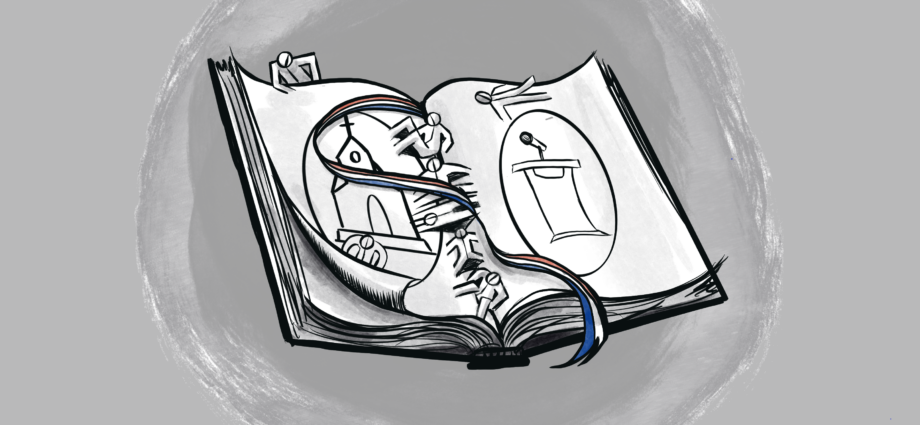By Pelle Keulen
Intro
Maybe if nobody had gotten hit by a car we would not still be talking about it. With the accompanying violence against journalists, the church services in Urk and Krimpen are getting a lot of attention. I mean this in the sense that they are in the news a lot, not referring to the fact that they are getting a lot of death threats. The decision to hold church services, despite the Coronavirus restrictions, is raising a very controversial question in the Netherlands. When does freedom of religion turn into preferential treatment?
Freedom of Religion
Of course, historically, the Netherlands has a very good reason why the state should not be allowed to interfere in religion. Given that it was the major reason why the country was created, during our insurrection against the Spanish, a bit of respect for the right to freedom of religion is probably justified. However, when it was created, freedom of religion meant freedom for everyone! Everyone was at least somewhat religious at the time and, usually, religion was a very important aspect of their lives. Freedom of religion then means: “For this very important part of life, everyone is free to do what they want!”
Naturally, there have always been limits on this freedom. The freedom of religion has never been absolute. If I want to start a Khornate cult, yell ”Blood for the Blood God!”, and ritually sacrifice people, that has never been allowed. However, in most cases, freedom of religion allowed important freedoms where it mattered, without becoming excessive.
A previous case where the conflict between societal values and religious practice came into focus, was with the ritual slaughter of animals. The strict requirements in the way animals were slaughtered in the Netherlands, clashed with the religious methods of both the Muslim and Jewish communities. Although new regulations were set and agreed upon, it is important to note that a major part of the resolution came from agreements between these communities and the Minister of Justice. New regulations, and more importantly more oversight, only came when the rules agreed upon were not being followed.
Does this sound familiar?
Preferential treatment
Previously, this issue was not brought up because the churches agreed to follow the rules. Of course, this was not being exactly monitored but that went for a lot of events. But now, with churches openly choosing to flaunt the rules, we have to come up with an answer. The real question is then: “When many of us do not have a church to go to, why are you going to church, exempt from the rules?” Of course, you can claim religion is important to you, but I claim the same for literally anything else. Prime examples given over the past week have been football, drinking, salsa dancing, and going to festivals. Not being religious doesn’t mean you do not have something which you consider important in your life. Most people agree that it is invasive to have the government interfere in a church service, but all the other corona measures are damn sure invasive as well. That is why the lack of government interference in the church services smacks of preferential treatment.
New conception of Freedom of Religion:
There is a phrase in Article 6 of the Dutch constitution, which provides the freedom of religion, that does actually allow for interference into religious proceedings. A good translation might be that everyone still retains a responsibility towards the law. As noted by other media, this means that the government can actually intervene, legally. It is reticence to do so which shows that we perhaps need a new concept for freedom of religion. Where a specific religion is not being targeted by new laws, but one where religion is nothing more than an important interest of a specific group of people. Akin to concerns over climate change, concerns over euthanasia or abortion, or any other myriad of issues. If you can convince the majority of the Netherlands to agree with you, things go your way. If you can not do so, tough luck.
Unlikely
Many Dutch people still place a large value on religion and are likely to oppose such a view. They are organized and, especially on this topic, very motivated. In contrast, most parties with a more non-religious bent seem to be satisfied with just speaking out against the incidents surrounding the church on Twitter. What helps in this regard is that the vast majority of churches are in fact sticking to the informally created rules, and speaking out against those who do not. With a good heart, we could attribute that to empathy and consideration for others. More cynically, they might realize that forcing a confrontation on this issue is a bad idea.
What next?
In a very tense environment, people are likely to get upset at what they see as preferential treatment. That is where a lot of the explosives and threats are coming from. Of course, a much better alternative would be to start your own religion. One that meets every Sunday and worships God through the consumption of holy beer, ritual dancing and watching football games. Then you get to accuse the police of religious persecution when they break it up. Of course, your ultimate victory would be when both you and the churchgoers get in trouble. Maybe we are all better off praying that they see the light.
Edited by Gunvir Paintal and Helena Reinders, artwork by Emma van den Nouweland

